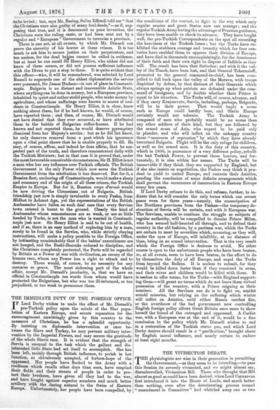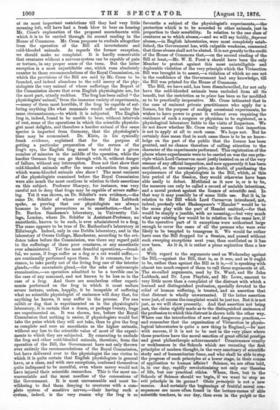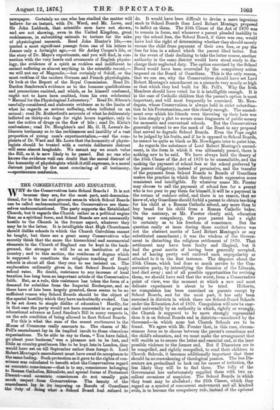THE VIVISECTION DEBATE.
T" physiologists are wise in their generation in permitting the Government,—as they seem to be intending,—to pass this Session its severely vivisected, and we might almost say, 43isembowelled, Vivisection Bill. Those who thought that Bill almost as good as could have been desired, when Lord Carnarvon first introduced it into the House of Lords, and much better than nothing, even after the deteriorating process termed "amendment in Committee" had whittled away one or two ot its most important restrictions till they had very little meaning left, will have had a fresh blow to bear on hearing Mr. Cross's explanation of the proposed amendments with which it is to be carried through its second reading in the House of Commons. Mr. Cross proposes to exclude altogether from the operation of the Bill all invertebrate and cold-blooded animals. As regards the former exception, we should make no complaint. It is hardly conceivable that creatures without a nervous system can be capable of pain or torture, in any proper sense of the term. But the latter exception is a most unjustifiable one, which runs absolutely counter to those recommendations of the Royal Commission, on which the provisions of the Bill are said by Mr. Cross to be founded, and indeed abandons to the cold mercy of the phy- siologists the very animal of whose sufferings the Report of the Commission shows that even English physiologists are, for the most part, utterly reckless. The frog has been called "the physiologists' animal," from the immense variety of experiments, —many of them most horrible, if the frog be capable of suf- fering anything like what mammals would suffer under the same circumstances,—to which it is subjected. The English frog is, indeed, found to be unable to bear, without intervals of rest, some of the operations in which the scientific physiolo- gist most delights, and therefore a hardier animal of the same species is imported from Germany, that the physiologist's time may be economised. Dr. Klein, in his cynically frank evidence, explained that for the purpose of getting a particular preparation of the cornea of the frog's eye the English frog must be rested for a given number oiminutes in the middle of the operation, while the hardier German frog can go through with it, without danger of failure without any interruption. Does not that show that cold-blooded animals suffer the same exhaustion from pain which warm-blooded animals also show? The most eminent of the physiologists examined before the Royal Commission were also much the most cautious in relation to their assertions on this subject. Professor Sharpey, for instance, was very careful not to deny that frogs may be capable of severe suffer- ing. Yet it was shown, on Dr. Schafer's own evidence —the same Dr. Schafer of whose evidence Sir John Lubbock spoke, as proving that our physiologists are always humane in their precautions as to antesthetics,—that in Dr. Burdon Sanderson's laboratory, in University Col- lege, London, where Dr. Schafer is Assistant-Professor, no anaesthetic, known to be mach, is ever administered to a frog. The same appears to be true of Dr. Rutherford's laboratory at Edinburgh. Indeed, only in one Dublin laboratory, and in the laboratory of Owens College, Manchester, according to the evi- dence taken before the Commission, was there any regard paid to the sufferings of these poor creatures, or any anaesthetic ever administered. Yet the most dreadful operations,—dread- ful, we mean, if frogs suffer as a dog or a cat would suffer,— are continually performed upon them. It is common, for in- stance, to take partly out of the living frog one of the interior glands,—the mesenteric gland,—for the sake of microscopic examination,—an operation admitted to be a terrible one in the case of any mammal, and not known to be less so in the case of a frog. And there are numberless other experi- ments performed on the frog in which it must endure severe torture, unless, happily, it be incapable of suffering what no scientific physiologist of eminence will deny that, for anything he knows, it may suffer in the process. For one rabbit or dog that is experimented on in the physiologist's laboratory, it is certain that a dozen, or perhaps twenty, frogs are experimented on. It was shown, too, before the Royal Commission that nothing is easier, if physiologists would but take the pains which they will not take, than to give the frog as complete and sure an anaesthetic as the higher animals, without any loss to the scientific value of most of the experi- ments to which they are subjected. By consenting to exclude the frog and other cold-blooded animals, therefore from the operation of the Bill, the Government have not only thrown over entirely the recommendations of the Royal Commission, but have delivered over to the physiologist the one victim to which it is quite certain that English physiologists in general have, as a class, and with rare exceptions, confessed themselves quite indisposed to be merciful, even where mercy would not have injured their scientific researches. This is the most un- warrantable and the most needless of the concessions of the Government. It is most unreasonable and most be- wildering to find them denying to creatures with a com- plete system of sensitive nerves,—their having such a system, indeed, is the very reason why the frog is so favourite a subject of the physiologist's experiments,—the protection which is to be accorded to other animals, just in proportion to their sensibility. In relation to the one class of creatures as to which abuses,—and we will say boldly, flagrant abuses,—in English laboratories, were most completely estab- lished, the Government has, with culpable weakness, consented that those abuses shall not be abated. It is not greatly to the credit of the House of Commons that,—on the second reading of the Bill at least,—Mr. W. E. Forst-; should have been the only Member to protest against this most unintelligible and deplorable violation of the very principle which the Vivisection Bill was brought in to assert,—a violation of which no one not in the confidence of the Government had any knowledge, till the Bill was printed for the House of Commons.
The Bill, we have said, has been disembowelled, for not only have the cold-blooded animals been excluded from all its, benefit, but the restriction as to place has been so far modified as to be practically inoperative. Mr. Cross intimated that in the case of eminent private practitioners who apply for a licence, for the purpose of makIng occasional experiments, he to have power to grant it without even requiring the- residence of such a surgeon or physician to be registered, as a physiological laboratory liable to the visits of Inspectors. We do not know whether Mr. Cross really means that inspection is not to apply at all to such cam. We hope not. But he- certainly does mean that in such cases there is to be no know- ledge on the part of the public that the licence has been- granted, and no chance therefore of calling attention to the- character of the experiments performed. This registration of the places where experiments were to be carried on was the one prin- ciple which Lord Caniarvon most justly insisted on as of the very essence of any official inspection, and now apparently it has been sacrificed, as the necessary price, no doubt, of purchasing the acquiescence of the physiologists in the Bill, which, at this late period of the Session, they would otherwise have been able easily to defeat. Mutilated as it now is, or is to be,. the measure can only be called a record of amiable intentions, and a moral protest against the licence of scientific seal. In that way it may possibly be of some little use. But it is, in relation to the Bill which Lord Carnaiwon introduced, not, indeed, precisely what Shakespeare's " Hamlet " would be to the same play with the part of Hamlet omitted,—for that would be simply a jumble with no meaning,—but very much what any existing law would be in relation to the same law, if to the operative part of it exceptions were authorised large enough to cover the cases of all the persons who were ever likely to be tempted to transgress it. We would far rather have seen the Bill dropped for a Session, and passed without such sweeping exceptions next year, than mutilated as it has- now been. As it is, it is rather a pious aspiration than a law- at all.
With regard to the arguments used on Wednesday against the Bill,—against the Bill, that is, as it was, and as it ought to be, rather than against the Bill as it is,—it is speaking with almost too much respect of them to call them arguments at all, The so-called arguments, used by Dr. Ward, and Sir John Lubbock, and Dr. Lyon Playfair, and Mr. Lowe, amount to- very little more than a complaint of the distrust with which a learned and distinguished profession, specially devoted to the relief of human suffering, is treated, and an assertion that that distrust is wholly unwarranted. If the latter assertion were just, of course the complaint would be just too. But it is not just, as we will show presently. And that assertion not being just, the claim rightly made as to the distinguished eminence of the profession to whichthis distrust is shown tells the other way. Where can the introduction of new and dangerous practices,— and remember that the organisation of Vivisection in physio- logical laboratories is quite a new thing in England,—be met with success, if it is not to be met in the very place where those practices have the moral sanction of great official prestige and great philanthropic achievements ? Countenance cruelty or recklessness in the Schools which are recasting the first principles of modern thought, in the very sanctuary of scientific- study and of humanitarian fame, and who shall be able to stop the progress of such principles at a lower stage, in their course of application to human affairs ? Science, we are often told, is, in our day, rapidly revolutionising not only our theories of life, but our practical ethics. Where, then, but in the Schools of Science should we begin, if we want to stop an evil principle in its germs ? Obsta principiis is not a new maxim. And certainly the beginnings of fruitful moral con- sequences are more often found in the lecture-rooms of able scientific teachers, in our day, than even in the pulpit or the newspaper. Certainly no one who has studied the matter will believe for an instant, with Dr. Ward, and Mr. Lowe, and Sir John Lubbock, that scientific men have not shown, and are not showing, even in the United Kingdom, great recklessness, in submitting animals to torture for the sake of physiological research. Read John Hunter's life,--we quoted a most significant passage from one of his letters to Jenner only a fortnight ago,---or Sir Astley Cooper's life, or the story of Dr. Mayo's experiments, and you will find, in con- nection with the very heads and ornaments of English physio- logy, the evidence of a spirit as reckless and indifferent to animal suffering as almost anything in the scientific record,— we will not say of Magendie,—but certainly of Schiff, or the most reckless of the modern German and French physiologists. Or look at the Report of the Royal Commission. Read Dr. Burdon Sanderson's evidence as to the humane qualifications and precautions omitted, and which, as he himself confessed, ought not to have been omitted, from his own celebrated "Manual for the Physiological Laboratory." Read Dr. Sibson's carefully-considered, and elaborate evidence as to the limits of what he regards as serious suffering, when inflicted on an animal ; read. Dr. Rutherford's accounts of what he deliberately inflicted on thirty-six dogs for eight hours together, only to test the action of drugs on the flow of bile ; read Dr. Klein's confessions ; read Dr. Houghton's and Mr. G. H. Lewes's de- liberate testimony as to the recklessness and inutility of a vast proportion of young men's experimentation,—and the com- plaints of Dr. Ward and Mr. Lowe that the humanity of physio- logists should be treated with a certain deliberate distrust will seem almost laughable. We cannot say we much value the Bill, as it is now likely to be passed. But no one who knows the evidence well can doubt that the moral distrust of the humanity of physiologists which it still expresses, is a moral distrust justified by the most convincing of all testimony, .---spontaneous confession.
































 Previous page
Previous page